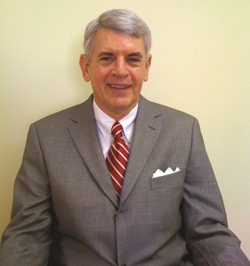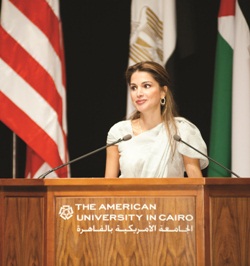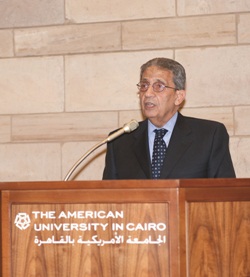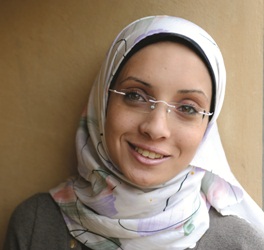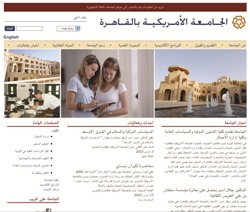
| |
| |
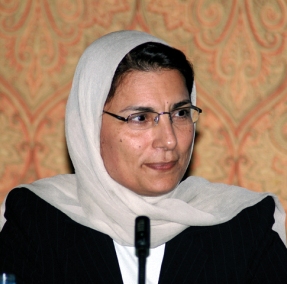
|
| |
Al-Misnad during the Knowledge Society Symposium
held by AUC in 2005 |
Leading Qatari Educator Named to Board of Trustees
AUC recently appointed leading Qatari educator and the president of the University of Qatar, Professor Sheikha Abdulla Al-Misnad, as a member of its Board of Trustees.
Prior to serving as president of the University of Qatar in 2003, Professor Al-Misnad held positions in teaching, administration and research at the university, including the posts of vice president for research and community development, head of the Department of Foundations of Education and head of the University Council.
Professor Al-Misnad received her Bachelor of Arts in education from the University of Qatar, as well as a diploma in education and her PhD from Durham University in the United Kingdom. She has also been awarded an honorary doctorate in civil law by Durham University in recognition of her outstanding achievements in the field of education.
Al-Misnad has played an important role in the reform of primary, secondary and private education in Qatar. She is a member of the Supreme Educational Council that oversees the reform of publicly funded education with the aim of establishing progressive and modern independent schools that are privately operated, but publicly funded.
B. Boyd Hight, chairman of AUC’s Board of Trustees, said that Al-Misnad will provide unique counsel as a member of the university’s board. “Professor Sheikha Al-Misnad’s professional experience in education and educational reform in the Arab region will provide AUC’s Board of Trustees with invaluable expertise in that field,” said Hight. “In addition, she will play a vital role in advancing AUC’s mission to serve the region in providing quality education to the next generation of leaders in the Arab world.” |
| |
School of Continuing Education Appoints New Dean
Charles Norman has been named dean of the School of Continuing Education. Norman
joins AUC from the University of Tennessee, where he held numerous positions, including
dean, vice chancellor and special assistant to the executive vice president of the University of
Tennessee state system.
Norman received his bachelor’s degree from Middle Tennessee State University, where he studied
plant and soil science with a minor in political science and education. After receiving his master’s in
agricultural extension education, he went on to earn a PhD in educational leadership, both at the
University of Georgia. When asked about his dual interests in agriculture and education, he said,“While I have stayed involved in agriculture programs throughout my career, all my leadership and
management positions have been educationally focused and community based.”
His previous experience includes work on public-policy grants, statewide outreach programs for the University
of Tennessee and distance-learning programs at the University of Georgia. Looking forward to his new role at
AUC, Norman said, “The School of Continuing Education has tremendous potential since it is already so
respected and well-connected to the community. I am excited to work with people to accomplish the school’s
goals in the community.” |
| |
Queen Rania Speaks at AUC
An alumna and a global advocate for community empowerment, Her Majesty Queen Rania Al Abdullah ’91 of Jordan recently spoke at AUC about the importance of civic engagement in the Arab region and the role it can play in improving lives and ensuring progress. In her address, she called on the next generation of young Arabs who have benefited from higher education to accept their obligation to advance their societies.
AUC President David D. Arnold noted that Queen Rania stands as a role model for young people around the globe, pointing out that she chose “a life of service and volunteer leadership on behalf of others,” and that her example stands “as a testament to all the best qualities that we wish our graduates to strive for.”
In her address, Queen Rania pointed out that civic engagement is rooted in Arab culture and that now is the time to revive it again and fuse fresh energy into it. She referred to the story of the founder of Alashanek ya Balady, Raghda El Ebrashi ’04, ’07, who at the age of 12 was inspired by a poor woman to start her foundation. The queen underscored how this story can serve as an example to be emulated by many others, saying that in “each and every one of us is the ability to look beyond ourselves. Civic engagement is about leaving the four walls of your life and looking up.” Queen Rania ended her talk by calling for action and change. “What are we waiting for? None of us can hope to fix everything, but each of us can do something,” she said, adding that people should not wait for governments to act. Civic engagement, she explained, “is a path to enlightenment” and even though it is not enough to elevate a country’s status, it is an indispensable part of it.
Barbara Ibrahim, director of the John D. Gerhart Center for Philanthropy and Civic Engagement, which organized the event, noted, “Her Majesty Queen Rania is a role model for those who believe that no matter how young one may be, determination and vision can result in important impact on our region and the reforms that are so urgently needed.”
To watch Queen Rania’s lecture on YouTube, visit www.youtube.com/auc. |
| |
Galal Amin Wins Arab Culture Award
Galal Amin, professor of economics, has received the Sultan Bin Al Owais Cultural Foundation Award, which recognizes distinguished works and rich contributions to Arab culture. Amin’s award was for the humanitarian and futuristic studies section in recognition of his contributions to economics, politics, community and culture.
“I felt quite honored and very happy to get this prestigious award, which is probably the most distinguished cultural prize in the Arab world,” said Amin. “It is really a very big boost to me.”
Amin is also the recipient of the Award for Economics from the Kuwait Foundation for the Advancement of Science; Order of Merit for the Sciences and Arts from the President of Egypt; and the State Prize for Economics (Egypt). |
| |
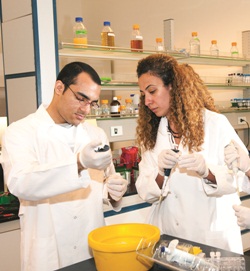
|
|
AUC’s biotechnology graduate students will benefit from the new PhD program in the field
|
|
New PhD Program Begins
The university has introduced its first PhD program in the School of Sciences and Engineering (SSE). The program will offer PhD degrees in applied sciences with specializations in nanotechnology, biotechnology and computer science; and in engineering with specializations in mechanical, construction, electronics and environmental engineering.
“This is an important milestone for AUC,” said AUC Provost Lisa Anderson. “It took five years of hard work and research to set up the criteria for this program. We investigated every single detail to make sure everything would go well –– faculty, facilities, accreditation, library and external funding.”
According to Medhat Haroun, SSE dean, “Surveys conducted by the university showed that there is strong interest from well-qualified students to pursue PhD degrees at AUC.
In fact, there is a real shortage in the number of highly qualified scientists at the doctoral level in fields such as biotechnology, bioinformatics, nanotechnology, information technology and cutting-edge engineering applications. AUC has opportunities to build human capacity in these disciplines and to address the shortage in highly qualified faculty members in the region.”
In his remarks at the PhD launch, Haroun noted that there are several factors that prompted the introduction of the PhD program. These include the strength of existing SSE master’s programs and the recent introduction of new innovative graduate programs in biotechnology, nanotechnology and food chemistry. In addition, the PhD program complements the strong foundation of SSE undergraduate studies and the international accreditation the school received from ABET, a recognized U.S. accrediting body for university programs in computing, engineering, technology and applied science. Haroun also credited faculty members at the School of Sciences and Engineering for their combined excellence and contributions to important ongoing research.
According to Amr Shaarawi, associate dean for graduate studies and research, the PhD program is open for students with MSc degrees from recognized schools. “We anticipate PhD students to receive their degrees in four years,” he said, explaining that the program will start with 10 students in the first year, and five additional new students per year, until reaching sustained enrollment of 25 students. “We are selecting a small number of students on purpose,” Shaarawi explained. “We want to guarantee quality, and it is important for us to do it well with a great deal of professionalism.” |
Capital Campaign Raises $125 Million
To celebrate the successful end of its comprehensive capital campaign, AUC held a Founders’ Dinner to honor major contributors. The campaign, which was officially launched in 2003, raised funds to build the New Cairo campus, improve the quality of education the university can offer, increase the number of scholarships based on academic excellence and financial need, as well as recruit high-quality faculty. The campaign has gone beyond its $100 million target, raising almost $125 million, of which more than half went to the establishment of AUC New Cairo.
Alumni played an active role in the campaign. The number of alumni donors amounted to 4,342, contributing more than $46 million. This represents the largest constituency in the number of donors, which totalled 6,830, and the second largest in the total amount donated. Seventy-one percent of the donors came from Egypt, followed by North America. There were also donations from the Gulf and other countries. |
AUC Launches Three New Schools
In two separate ceremonies held at AUC New Cairo, the university launched its new School of Global Affairs and Public Policy (GAPP) and the School of Business (BUS), as well as the Graduate School of Education (GSE). Although the three schools have been operational since last fall, the ceremonies marked the official launch, and were attended by Egyptian and international dignitaries.
GAPP is composed of three academic departments: law, public policy and administration, and journalism and mass communication. The school also includes five research centers and programs covering a wide range of topics including gender and women’s studies, electronic journalism, Middle East studies, American studies, as well as migration and refugee studies. Highlighting the importance of the school’s programs, Ambassador Nabil Fahmy ’74, ’77, founding dean of GAPP, noted that in today’s world, the global community needs to “empower itself with inclusive multidisciplinary thinking, tolerance for others and a global outlook to the policy issues it faces.”
BUS is made up of three departments: economics, management and accounting. It also includes the Management Center, as well as multiple executive education and research centers. In 2006, the school received accreditation by the Association to Advance Collegiate Schools of Business International, making it one of only 5 percent of all business schools in the world to receive such accreditation. “The School of Business is extremely ambitious, and our goal is to claim a rank among the world’s top 100 schools,” said Sherif Kamel ’88, ’90, dean of BUS.
GSE offers professional educator diploma programs in five areas: educational leadership, early literacy education, teaching diverse learners, integrated educational technology for classroom teachers and teaching for non-education majors. The school also offers parenting courses to Egyptian families, and a master’s program in international and comparative education will begin in Fall 2010. In addition, the school’s Middle East Institute of Higher Education targets research, policy dialogue and capacity building for post-secondary institutions worldwide. “With this school, we have an opportunity to bring the best education research, practices and perspectives in the world to Egypt,” said AUC Provost Lisa Anderson.
To watch the events on YouTube, visit www.youtube.com/auc. |
Amre Moussa Delivers Nadia Younes Lecture
As part of the annual Nadia Younes Memorial Lecture, in remembrance of Nadia Younes who tragically lost her life in 2003 while serving as the chief of staff for the special representative of the UN secretary-general in Iraq, Amre Moussa, secretarygeneral of the League of Arab States, delivered a public lecture on international service. Explaining the risks and challenges facing the United Nations, Moussa spoke about the instrumental role international organizations and international law must play in alleviating the conflicts in the region, such as the war in Iraq and the Arab-Israeli conflict, as well as in combating global crises like climate change, food security and water shortage.
“It is detrimental to stability to marginalize the United Nations,” Moussa noted. “In the Middle East, we continue to feel this marginalization, especially in the failure of the UN Security Council to seek a just solution to the Arab-Israeli conflict and the rights of the Palestinian people.” Because the United Nations serves as a vehicle committed to fairness, justice and international principles of human rights, Moussa urged students to champion its cause. “As days pass by, I feel more and more that my generation will not be able to solve this conflict,” he said. “You need to know what awaits you. We have failed time and again, and it’s because of the marginalization of the United Nations.”
To watch Amre Moussa’s lecture on YouTube, visit www.youtube.com/auc. |
LEAD Student Receives Moataz Al Alfi Award for Philanthropy
Hagar Ibrahim, computer science junior in AUC’s Leadership for Education and Development program, received the Moataz Al Alfi Award for Excellence in Civic Engagement and Philanthropy.
Offered by Al Alfi Foundation for Human and Social Development, the award was established by prominent philanthropist, business leader and Vice Chairman of AUC’s Board of Trustees Moataz Al Alfi to recognize an undergraduate junior who balances academic achievement with leadership in philanthropy and service to the broader community. The award, which has both a financial and a mentoring component, requires candidates to submit a proposal identifying a key issue in society and provide a potential solution or campaign. Ibrahim’s project is to develop a software engineering company, where she will employ 20 students from local public high schools as interns to provide them with training in computer programming.
“To be a good programmer in Egypt is not an easy thing; it is a very competitive field,” said Ibrahim. “I was hoping to find the place where I can develop my skills and gain the knowledge and experience to become a professional programmer. I want to provide public school students this opportunity because I believe they all have high potential if guided in the right direction with proper training and experience.”
In addition to community-service work on campus, Ibrahim also participated in off-campus activities, including volunteering with Bibliotheca Alexandrina and the Suzanne Mubarak Women’s International Peace Movement. She was also secretary-general of the Alexandria International Model United Nations, a speaker and moderator at the Islamic conference youth forum, and a study-abroad student at Portland State University in the United States. |
| |
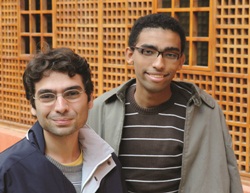
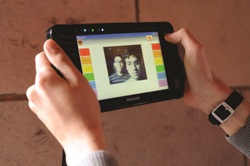 |
Kashef and Mahmoud |
Students Awarded First Prize for Emotion Recognition Project
AUC engineering students received first prize at the 11th International ACM SIGACCESS Conference on Computers and Accessibility for their project on assistive technologies for individuals on the autism spectrum. The project, part of the Affective Computing research group at the Massachusetts Institute of Technology’s (MIT) Media Laboratory, creates a wearable system designed to recognize a person’s emotions through analyzing facial expressions in a video.
The project was co-authored by Abdelrahman Mahmoud, AUC computer engineering senior; Youssef Kashef, AUC electronics engineering senior; and Mish Madsen, graduate student at the MIT Media Laboratory. The project was supervised by Rana El Kaliouby ’98, ’00, who currently holds a research scientist position at MIT.
The three-year project at MIT is funded by the U.S. National Science Foundation and aims to develop a wearable socialemotional system to help autistic individuals improve their communication abilities by detecting the social cues of others. It is currently being piloted at the Groden Center, a school for autism spectrum disorders in the United States. “[The research] is human centered so it is not just about computers and machines. People actually benefit from it,” said Kashef. |
| |
AUC Launches Arabic Web Site, Magazine
As part of its outreach to the Arabic-speaking community, AUC launched a new Web site in Arabic. The site will serve as the communication hub for all Arabic content, including the biannual magazine, In Arabic, which includes Arabic articles covering topics such as faculty research, alumni achievements and community outreach. This new initiative and AUC’s Arabic Facebook page allow Arabic speakers to gain access to information about academic and research activities, cultural events and university news.
Describing the importance of this initiative, Moataz Al Alfi, vice chairman of the university’s Board of Trustees, noted, “Despite the pivotal role that AUC has played throughout the years in education and service, its connection with the Arabic-speaking community needed endorsement. Therefore, it was imperative to find a channel of communication between the university and the different constituents of the Arabic-speaking community because AUC is a vital bridge between East and West, connecting Egypt and the region with the world at large.”
The Arabic Web site includes pages currently available on the English version of the AUC Web site that are relevant to the Arabic-speaking community. The site will also promote public events that are in Arabic or feature Arabic translation. |
| |
Library Receives 20,000 Volumes of Rare Books Collection
The Rare Books and Special Collections Library recently received a 20,000-volume book collection from philosophy professor Father Pierre Riches.
An Italian priest, Riches was born in Alexandria, Egypt. Describing his affinity with the city, he noted, “I feel very connected to Alexandria, belonging and a product of that very particular place that Alexandria was from approximately 1880 to 1945 or so –– insulated, cosmopolitan, very particular and non-repeatable.”
Having completed his studies at Victoria College, Riches acquired his master’s in philosophy from Cambridge University and his doctorate in theology from the Pontifical Lateran University in Italy. Riches held visiting professorships at Loyola University, at both the Chicago and Rome campuses, and at the College of the Holy Cross in Worcester, Massachusetts. He has also lectured in the philosophy department of Georgetown University in Washington, D.C.
The assorted works, which come in a variety of languages, represent numerous genres including rare and first-edition books and manuscripts; books signed by their authors; political and historical tracts; pieces on fine arts, cinema and photography; as well as thousands of novels, short stories, plays, philosophical treatises and books of poetry. “The wealth of this collection from an intellectual perspective alone demonstrates the absolute boon it will be to AUC students, faculty and researchers,” said Philip Croom, associate dean of the rare books library. “These works represent a real treasure trove.”
Riches’s extensive collection is the combination of works that he has collected throughout his life, including gifts from well-known literary friends and books bequeathed to him by family members. Explaining why he chose AUC, Riches noted, “They have enough books in Europe and not enough in Egypt, so I hope these books have an educative effect.”
AUC Trustee Sadek Wahba ’87, managing director of the U.S.-based Morgan Stanley who donated the shipping costs, explained the importance of such a collection to the university. “This gift attests to the important intellectual role AUC plays in the region, bridging cultures and providing the students with a true liberal arts education.”
Sharing the same viewpoint, Catarina Belo, assistant professor of philosophy at AUC, added, “This extraordinarily generous gift, for which the philosophy department is most grateful, will significantly boost the library holdings in philosophy and greatly assist our faculty, students and visitors with their academic work and scholarly interests.” |
| |

Professor Galal Amin

Vice Provost Ali Hadi 
Ambassador Nabil Fahmy

Professor Salima Ikram
|
|
Provost Starts New Lecture Series
Provost Lisa Anderson established a new series of lectures at the university that will provide AUC professors with the opportunity to showcase their research and scholarship to faculty and students, as well as the Egyptian community at large. Anderson noted that AUC’s faculty includes prominent scholars from around the world and that much of the research taking place by faculty members is being recognized globally. “We hope that this begins a series of dialogues with the bigger society which we are part of,” said Anderson. “We would like it to be reciprocal, so that people would not only get the chance to see our faculty, but they would also be able to follow up with their research.”
Each semester, the provost will host four lectures –– three in English and one in Arabic. Translation will be provided for all lectures. For the Spring 2010 semester, Ali Hadi, vice provost and professor of mathematics and actuarial science, will deliver a lecture on May 5 titled “Visualizing Data Beyond Three-Dimensions: An Introduction to the Visualization of Massive, High-Dimensional Data.” Other faculty members who gave lectures this semester include Ambassador Nabil Fahmy ’74, ’77, dean of AUC’s School of Global Affairs and Public Policy; Galal Amin, professor of economics and renowned author; and Salima Ikram, professor of Egyptology and leading scholar in Egyptian funerary archaeology.
To watch the Provost’s Lecture series on YouTube, visit www.youtube.com/auc. |
| |
AUSACE Conference Draws Prominent Media Scholars
Under the theme Innovative Media in a Changing Middle East, AUC hosted the 14th annual Arab-U.S. Association for Communication Educators Conference (AUSACE). The main objective of the conference was to provide a forum for communication educators, students and media professionals throughout the Middle East, the United States and the rest of the world to discuss the innovation of media and its ongoing, uneven impact on a changing region.
“This is a valuable opportunity to share ideas and exchange lessons and to encourage and promote cross-cultural, intellectual and scientific dialogue,” said Naila Hamdy, chair of AUC’s journalism and mass communication department and AUSACE president.
The conference was attended by a large number of media academics and scholars from different Egyptian and Arab institutions, including AUC, as well as Cairo, Ain Shams, Suhag, Kuwait, Lebanese, Sharjah and Algeria universities. It was also attended by media professors from the United States, Europe and Asia. |
|

